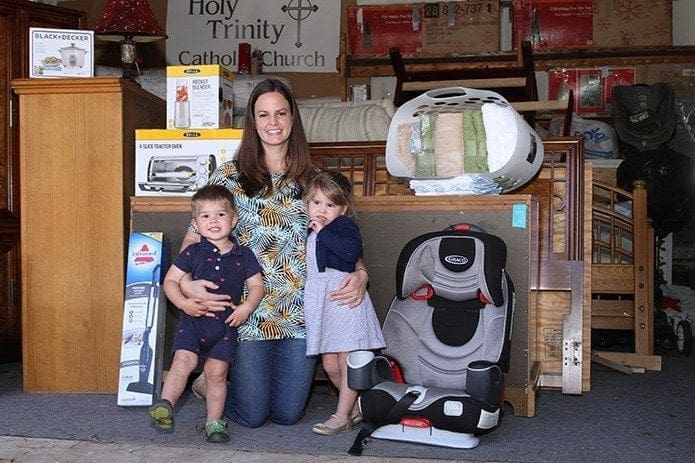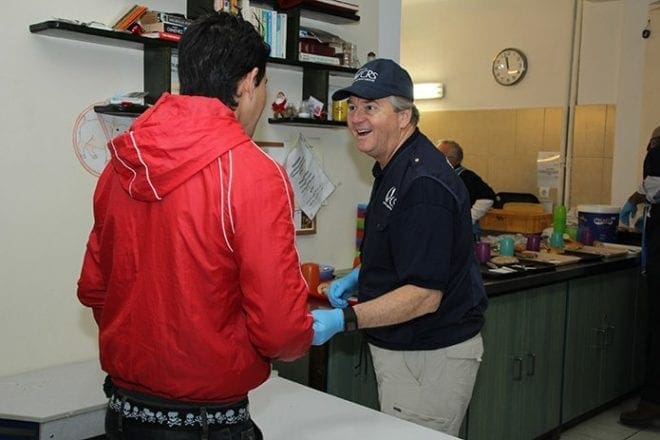 Photo By Michael Alexander
Photo By Michael AlexanderPeachtree City
Plight of refugees touches hearts at Holy Trinity Church, leading to action
By NICHOLE GOLDEN, Staff Writer | Published March 18, 2016
PEACHTREE CITY—Parishioners of Holy Trinity Church in Peachtree City have answered the plea of Pope Francis to sponsor refugees by adopting a family of 11 fleeing persecution in Myanmar.
Before the Sunday Angelus at St. Peter’s Square on Sept. 6, 2015, the pope appealed to all European parishes, monasteries and religious communities to host a refugee family.
“Faced with the tragedy of tens of thousands of refugees who flee death from war and hunger, and who have begun a journey moved by hope for survival, the Gospel calls us to be ‘neighbors’ of the smallest and the abandoned, and to give them concrete hope,” said Pope Francis in the address.
Led by Jennifer Harmeling of Sharpsburg, a group of Holy Trinity members decided to join the efforts. The group will work with Catholic Charities Atlanta to help resettle a family in their Fayette County community.
Harmeling organized a March 3 Refugee Forum at the parish to help others learn about the refugee crisis and the rigorous process of seeking asylum in the United States.
Forum speakers included Frances McBrayer, program director for refugee resettlement with Catholic Charities Atlanta; Edly Vliet, community relations officer for the Atlanta office of U.S. Citizenship and Immigration Services; and Deacon Steve Swope, a Catholic Relief Services global fellow.
Harmeling first began thinking of helping refugees after watching an “Anthony Bourdain: Parts Unknown” television program on Lebanon. The episode highlighted the challenges of refugees living in camps there.
“It just really touched me,” said Harmeling.
She tried to quiet thoughts of being called to help, but that changed last summer.
“Then, the little boy washed up on shore,” she said about the drowning of a Syrian child whose family was trying to reach Greece. A mother of two, Harmeling could not forget the tragedy captured in photographs of a Turkish officer carrying the child’s body.
In opening the forum, Harmeling said some might wonder, “Why are you doing this? Why do you care?”
She urged attendees to keep open minds and share knowledge gained about the refugee crisis.
“It could just as easily be me and you,” she told those gathered.
Former refugees helping this effort
Holy Trinity is the first church in the archdiocese since 2003 to sponsor a refugee through Catholic Charities. The parishioners have experience, previously adopting the Hoti family escaping war-torn Kosovo in 1999.
Two members of the Hoti family, Mili Hoti and his sister, Ludja Halili, shared their experience of spending three months in a refugee camp with occasional peanut butter to eat and water but most days no food at all.
“I am so blessed to be in front of you tonight,” said Halili. “I thought about this all day.”
Halili was just 12 when her family arrived at Hartsfield-Jackson Atlanta International Airport.
Now a happily married mother of two sons, Halili said she is grateful her family won’t have to be afraid or hungry.
“They will never have to look over their shoulder,” she said. “I’m so thankful there’s good people still out there.”
Halili’s brother joined her at the lectern as she became emotional. After their experience of fleeing, he said the family couldn’t believe in a better day.
“What day and what time is our life going to be taken?” had been their way of thinking for so long.
After a long plane ride to New York and another to Atlanta, the Hotis were anxious about what to expect.
“It was as scary as anything,” said Hoti.
Seventeen years later, Hoti is an engineer, a homeowner and has no debt.
“What we have today, it’s unbelievable. It’s next to perfect,” he said. “We’re so grateful. Holy Trinity Church did save us probably from being dead if not for them taking us out of that camp.”
The Hotis, who are Muslims, regularly participate in events at Holy Trinity like the CRS Helping Hands meal-packing day last December. Volunteers packaged hundreds of ready-to-eat meals for impoverished residents of Burkina Faso. The Hotis pledged support to the new refugee family from Myanmar arriving in April.
Holy Trinity parishioner Gerry Carolan led the outreach to the Hoti family 17 years ago. Mili Hoti still drives by Carolan’s old house just to remember her support.
Harmeling is now drawing upon Carolan’s wisdom and encouragement.
“I was so overwhelmed I didn’t know where to start,” said Harmeling. “She had a ton of lessons learned.”
Deacon sees conditions overseas
Deacon Swope, of St. George Church in Newnan, provided forum attendees with an overview of his trip in late January to Greece and Serbia where Catholic Relief Services is among agencies aiding refugees fleeing Syria, Iraq, Afghanistan and other nations.
“Why should Catholics care?” asked Deacon Swope. “I think it’s summed up in the story of the Good Samaritan.”

Deacon Steve Swope, of St. George Church, Newnan, traveled in late January to Greece and Serbia to work with refugees along with Catholic Relief Services. He is shown serving food to one of the refugees during his trip. Deacon Swope shared his experiences at the March 3 Refugee Forum held at Holy Trinity Church, Peachtree City. Photo By Mikaele Sansone/Catholic Relief Services
This type of service to others dictates our salvation, he said.
Deacon Swope noted that the people of Syria really have only four choices: to stay in the civil war in their country and risk death; to live in a refugee camp in Jordan or elsewhere; to migrate to other cities where they live in destitution as street people; or to make their way to Europe by way of Turkey and the Aegean Sea and seek asylum.
The deacon, who traveled with other clergy to Greece, shared stories of people he met. Many arriving in the morning in below-freezing weather had no hats or coats, and children often were shoeless.
Deacon Swope met one father seeking treatment for his son’s flu at a medical clinic. The father was a civil engineer who spoke four languages. He had moved to three different homes in Syria, and bombs destroyed the house each time.
“It was time to get his family out,” said the deacon.
CRS is providing shelter, food, clean water and translation services so refugees can make informed decisions about asylum.
“It’s a beautiful thing to see how the church has responded,” said Deacon Swope.
CRS is partnering with Caritas Greece and Caritas Athens and a number of other nonprofit groups to fill in gaps in services.
The deacon said he is inspired by the Holy Trinity group and hopes to see other parishes develop similar projects.
“This is the Year of Mercy,” he said. “Mercy is where God’s love meets the pain and chaos of the world.”
Vlilet of USCIS, the government agency that oversees lawful immigration to the United States, said the agency is “deeply committed” to both safety and offering refuge to vulnerable populations.
USCIS works closely with the U.S. State Department and FBI to conduct name checks of those seeking asylum, she said. They crosscheck information provided during separate interviews of refugees.
“We will take those steps before they’re even allowed to come to the U.S.,” emphasized Vliet.
She encouraged forum participants to visit the USCIS facts page online, devoted to the stringent refugee security and screening process.
“Most folks think they can just come in. It’s a lengthy process,” said Vliet.
Refugee family of 11 arrives in April
The family adopted by Holy Trinity includes a widowed father, his three grown children and their spouses, and four young children under the age of 6.
McBrayer of Catholic Charities Atlanta, a designated refugee resettlement agency, said the process of obtaining asylum often takes 18 to 24 months.
Refugees must first register with the United Nations High Commissioner for Refugees and request third country resettlement. If requesting asylum in America, they are referred to the U.S. State Department and then undergo a process of security and medical checks. If approved, the State Department forwards names to approved resettlement agencies. The U.S. Conference of Catholic Bishops’ Office of Migration and Refugee Services resettles about 30 percent of refugees to the U.S. each year. Catholic Charities Atlanta is one of the agencies to receive refugees via the bishops’ conference.
“You are the first parish to do this in a really long time,” McBrayer told the group.
The family arriving are Rohingya people, whom Amnesty International and other human rights organizations call the “most persecuted” in the world.
“They are considered a stateless people,” said McBrayer. “They have been living in chaos a very long time.”
The family will need safe, affordable housing, access to resources such as groceries, and transportation.
Harmeling used a committee structure developed by Carolan to address the family’s needs, including learning English, securing employment and education of the children.
Holy Trinity volunteers will meet the family at the airport.
“You guys will take them home,” said McBrayer. “Cultural orientation starts from the beginning.”
This orientation includes everything from use of children’s car seats to simply how to operate the oven or the dishwasher.
Refugees receive Medicaid benefits for eight months but have to pay back travel costs within 42 months. For the family from Myanmar, this debt will be close to $11,000.
“They are work authorized when they arrive,” said McBrayer. “The goal is self-sufficiency.”
According to McBrayer, 89 percent of the refugees assisted by Catholic Charities Atlanta are self-sufficient within six months of arrival.
“You cannot fail”
Following the forum, volunteers selected index cards listing needed items ranging from kitchen tools to linens to help furnish a home for the family. The 40 people attending committed to purchasing almost all of the necessary items.
“I’m blown away,” said Harmeling.
Forum attendees also learned about Harmeling’s other endeavor of collecting baby carriers for refugee moms through Carry the Future, a grassroots organization. So far, 2,500 carriers have been distributed.
“As a mom, it really spoke to me,” she said. “What an amazing difference this can make.”
Carrier drop-off sites include Holy Trinity Church and the Fayette public library branch in Peachtree City. New or gently used carriers may be donated for distribution so that fleeing parents can safely travel with their children.
Harmeling said they hope to find a home to rent for the family soon and plan to donate the first month’s rent and security deposit. A donation of a golf cart, to assist the family in getting around Peachtree City, is being sought.
A local consignment store has committed to providing a clothing allowance for each family member to select needed items, and a food pantry has agreed to supply food for several weeks after arrival.
Harmeling also needs transportation volunteers on a long-term basis.
“I’m going to need a lot of people who, say on a Tuesday, can take, X, Y and Z to work,” she explained.
Harmeling knows it will take a team of dedicated volunteers to help this family adapt to life in Georgia and foresees partnering with other churches and community groups.
“I’ve never done anything remotely similar to this before,” she said in admitting anxiety.
Deacon Swope offered assurance to her and the group.
“You cannot fail. This is God’s work,” he told them.
Harmeling expressed hope that other parishes will replicate the idea by adopting arriving families. Annually, Georgia communities welcome 2,500 to 3,000 refugees.
“The biggest thing for me is this Year of Mercy,” said Harmeling. “Let’s live out our faith.”
To learn more about Holy Trinity Church’s effort to adopt a refugee family from Myanmar, go to www.facebook.com/HolyTrinityPTCRefugeeAdoption/ or email Jennifer Harmeling at JNHarmeling@gmail.com. For details on how Catholic Charities Atlanta works to resettle refugees, visit www.catholiccharitiesatlanta.org.